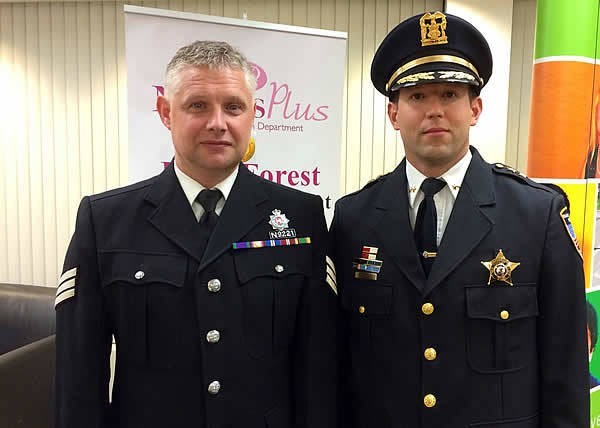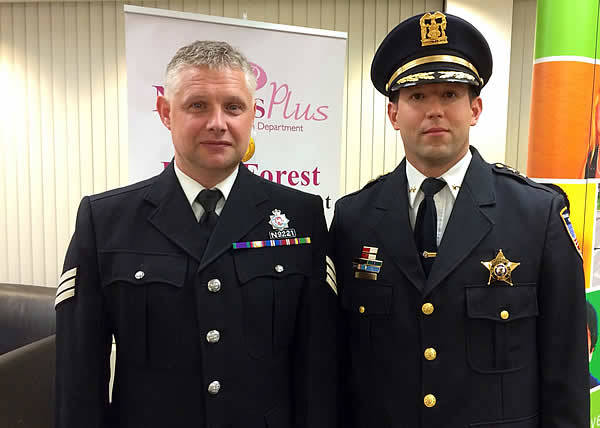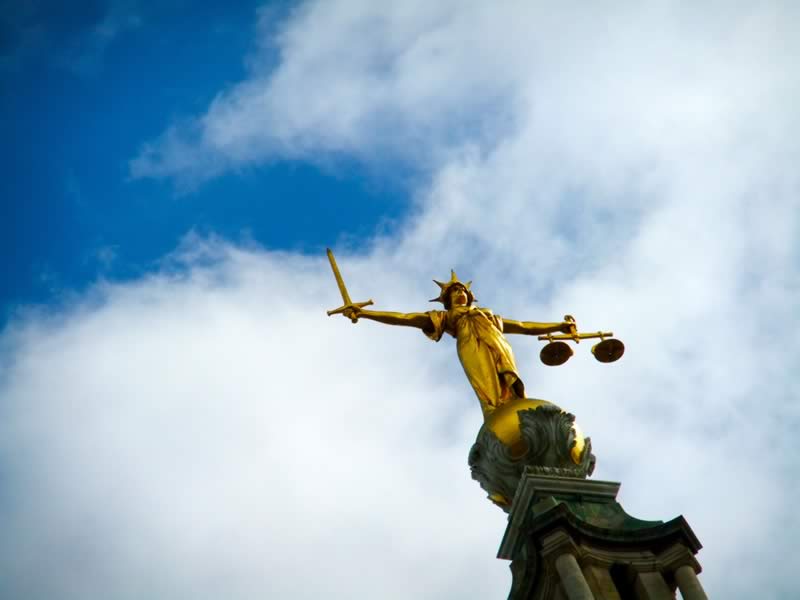
Park Forest, IL-(ENEWSPF)- The Park Forest Police have a personal connection to Monday night’s Manchester terrorist attack.
In 2014, the department hosted Sgt. Garry Watters, Greater Manchester Police, United Kingdom, who worked with the Park Forest Police Department through the month of October in a professional and cultural exchange.
I remember Sgt. Watters’ presentation to the Village Board.
The PFPD put a statement of support on their Facebook page, remembering Sgt. Watters specifically:
Sergeant Gary Watters, a Greater Manchester Police Sergeant, was an honorary member of the Park Forest Police Department for a month in 2014 as he worked with our agency, learning about American policing. Tonight’s violence in Manchester, though an ocean away, hits close to home.
Best wishes to Sergeant Watters and his colleagues as they work a tragic and chaotic scene, and thoughts and prayers to the people of Manchester. Stay safe.
The Greater Manchester Police offer the following counsel to “anyone exposed to the incident at Manchester Arena.”
Following the Manchester Arena Incident
This guidance is aimed at anyone exposed to the incident at Manchester Arena that took place on 22 May 2017. The emotional effects will be felt by survivors, bereaved families, friends, emergency services, health care workers and the general public. If you witnessed or lost someone in the attack you will most certainly have a strong reaction. Reactions are likely to be strongest in those closest to the incident, who directly witnessed the aftermath and who were involved in the immediate care of victims.
Common reactions to traumatic events
The following responses are normal and to be expected in the first few weeks:
- Emotional reactions such as feeling afraid, sad, horrified, helpless, overwhelmed, angry, confused, numb or disorientated
- Distressing thoughts and images that just pop into your head
- Nightmares
- Disturbed sleep or insomnia
- Feeling anxious
- Low mood
These responses are a normal part of recovery and are the mind’s mechanisms of trying to make sense and come to terms with what happened. They should subside over time.
What can people do to cope?
- The most helpful way of coping with an event like this is to be with people you feel close to and normally spend time with.
- If it helps, talk to someone you feel comfortable with (friends, family, co-workers) about how you are feeling.
- Talk at your own pace and as much as you feel it’s useful.
- Be willing to listen to others who may need to talk about how they feel.
- Take time to grieve and cry if you need to. Letting feelings out is helpful in the long run.
- Ask for emotional and practical support from friends, family members, your community or religious centre.
- Try to return to everyday routines and habits. They can be comforting and help you feel less out of sorts. Look after yourself: eat and sleep well, exercise and relax.
- Try to spend some time doing something that feels good and that you enjoy.
- Be understanding about yourself.
How can children be helped to cope?
- Let them know that you understand their feelings.
- Give them the opportunity to talk, if and when they want to.
- Respect their pace.
- Reassure them that they are safe.
- Keep to usual routines.
- Keep them from seeing too much of the frightening pictures of the event.
When should a person seek more help?
In the early stages, psychological professional help is not usually necessary or recommended. Many people recover naturally from these events. However, some people may need additional support to help them cope. For example, young children, people who have had other traumatic events happen to them and people with previous mental health difficulties may be more vulnerable.
If about a month after the event anyone is still experiencing the following difficulties, it is a good idea to seek help:
- Feeling upset and fearful most of the time
- Acting very differently to before the trauma
- Not being able to work or look after the home and family
- Having deteriorating relationship difficulties
- Using drugs or drinking too much
- Feeling very jumpy
- Still not being able to stop thinking about the incidents
- Still not being able to enjoy life at all
You can access help by:
- Speaking to your local GP
- Accessing your local NHS psychological therapies service:
- Bury, Oldham, Stockport, Tameside and Glossop – Pennine Care Healthy Minds
- Heywood, Middleton and Rochdale – Thinking Ahead
- Wigan – North West Boroughs Trust
- Bolton – https://www.gmmh.nhs.uk/bolton
- Manchester – https://www.gmmh.nhs.uk/manchester-services
- Salford – https://www.gmmh.nhs.uk/salford
- Trafford – https://www.gmmh.nhs.uk/trafford
- Samaritans (116 123) operates a 24-hour service available every day of the year.
- Childline (0800 1111) runs a helpline for children and young people in the UK. Calls are free and the number won’t show up on your phone bill.
- PAPYRUS (0800 068 41 41) is a voluntary organisation supporting teenagers and young adults who are feeling suicidal.
- The Sanctuary (0300 003 7029) operates a 24-hour service available every day of the year, for people who are struggling to cope – experiencing depression, anxiety, panic attacks or in crisis.
Document Source: Greater Manchester Police









